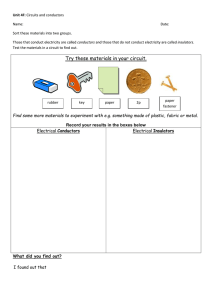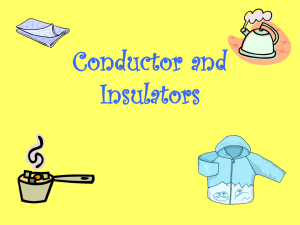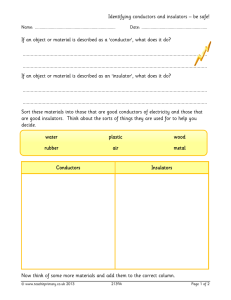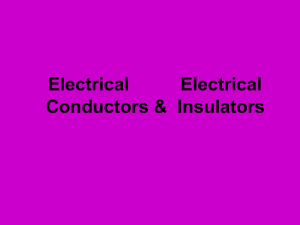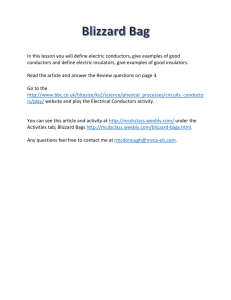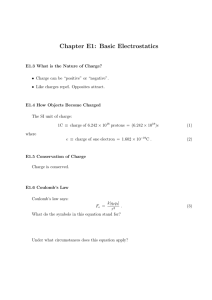Lesson 7. Topic: “Conductors and insulators”. Grammar material
advertisement
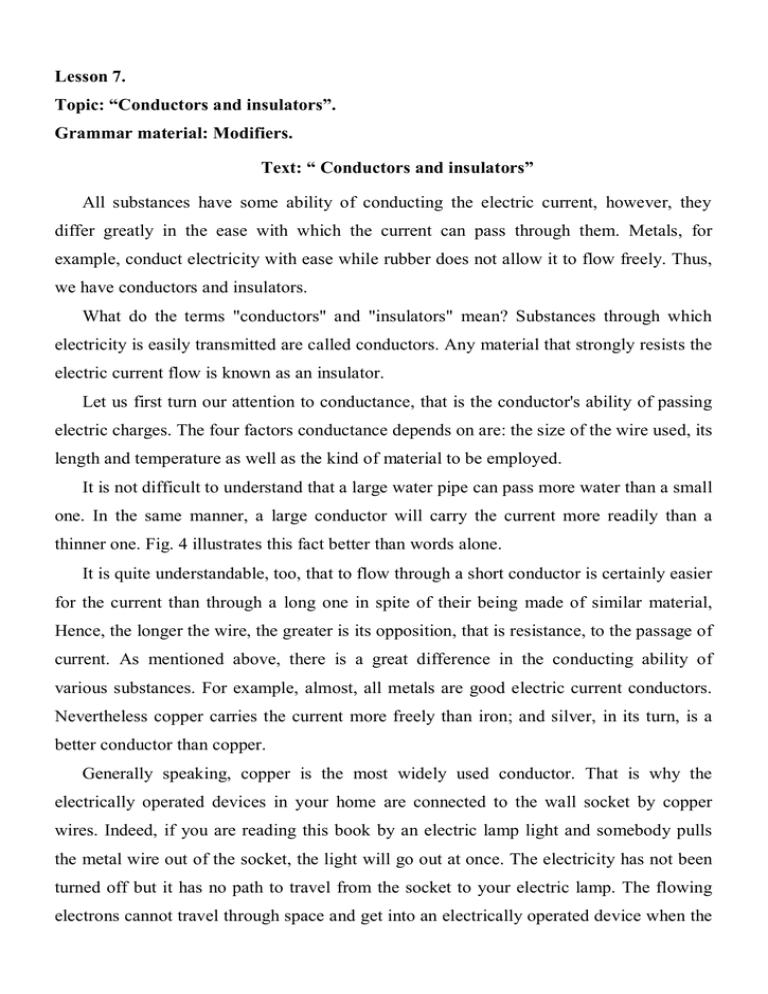
Lesson 7. Topic: “Conductors and insulators”. Grammar material: Modifiers. Text: “ Conductors and insulators” All substances have some ability of conducting the electric current, however, they differ greatly in the ease with which the current can pass through them. Metals, for example, conduct electricity with ease while rubber does not allow it to flow freely. Thus, we have conductors and insulators. What do the terms "conductors" and "insulators" mean? Substances through which electricity is easily transmitted are called conductors. Any material that strongly resists the electric current flow is known as an insulator. Let us first turn our attention to conductance, that is the conductor's ability of passing electric charges. The four factors conductance depends on are: the size of the wire used, its length and temperature as well as the kind of material to be employed. It is not difficult to understand that a large water pipe can pass more water than a small one. In the same manner, a large conductor will carry the current more readily than a thinner one. Fig. 4 illustrates this fact better than words alone. It is quite understandable, too, that to flow through a short conductor is certainly easier for the current than through a long one in spite of their being made of similar material, Hence, the longer the wire, the greater is its opposition, that is resistance, to the passage of current. As mentioned above, there is a great difference in the conducting ability of various substances. For example, almost, all metals are good electric current conductors. Nevertheless copper carries the current more freely than iron; and silver, in its turn, is a better conductor than copper. Generally speaking, copper is the most widely used conductor. That is why the electrically operated devices in your home are connected to the wall socket by copper wires. Indeed, if you are reading this book by an electric lamp light and somebody pulls the metal wire out of the socket, the light will go out at once. The electricity has not been turned off but it has no path to travel from the socket to your electric lamp. The flowing electrons cannot travel through space and get into an electrically operated device when the circuit is broken. If we use a piece of string instead of a metal wire, we shall also find that the current stops flowing. A material like string which resists the flow of the electric current is called an insulator. There are many kinds of insulation used to cover the wires. The kind used depends upon the purposes the wire or cord is meant for. The insulating materials we generally use to cover the wires are rubber, asbestos, glass, plastics and others. Rubber covered with cotton, or rubber alone is the insulating material usually used to cover desk lamp cords and radio cords. Glass is the insulator to be often seen on the poles that carry the telephone wires in city streets. Glass insulator strings are usually suspended from the towers of high voltage transmission lines. One of the almost insulators of all, however, is air. That is why power transmission line wires are bare wires depending on air to keep the current from leaking off. Conducting materials are by no means the only materials to play an important part in electrical engineering. There must certainly be a conductor, that is a path, along which electricity is to travel and there must be insulators keeping it from leaking off the conductor. II. Give the Russian equivalents for the words and word combinations below: 1) conductors; 2) insulators; 3) transmit; 4) resistance; 5) passage of current; 6) socket; 7) to connect to; 8) cord; 9) high voltage transmission line; 10) leak off. III. Find in the text the sentences with the following related words and translate them: conducting – conductor – conductivity – conductance IV. Guess what it is? 1.used to cover desk lamp cords 2. one of the most important insulators of all 3. the most widely used conductor 4. a better conductor than copper 5. not so good conductor as copper 6. the insulator usually used on the city street poles and high voltage transmission lines V. State questions to the underlined words: 1)Solid metals conduct electricity with ease. 2)Conductance depends on the four factors. 3)There are many kinds of insulation used to cover the wires. 4)Insulators keep electricity from leaking off the conductor. 5)Conductors play an important role in electrical engineering. VI. Say whether these sentences are true or false: 1)Electrical conductivity of a body depends upon its atomic constitution. 2)There is no difference in the conducting ability of various substances. 3)The longer the wire is the weaker its opposition is. 4)The kind of the insulating material depends upon the purpose it is meant for. 5)Conductors are substances through which electricity is easily transmitted. 6)Insulators do not allow the electric current to flow freely. VII. Talk on the conducting ability of various substances and their appliance in electrical engineering. Use the table in Task IV. Test : Conductors and insulators. I. Fill in the blanks with the words and phrases: A bare wire, poles, electrical engineering, insulation, opposition, to resist, similar, turned off, air, cord, covers, glasses, leak off, rubber, socket, is transmitted. 1. A …… is a small insulated cable. 2. We need …… for a chemical experiment. 3. When the temperature rises …… to the passing current increases. 4. …… is a perfect insulator. 5. If the switch is …… the current does not flow. 6. …… is a poor conductor electricity. 7. …… is a wire not covered with insulated material. 8. We study … . 9. If a wire is covered with … it is called an insulated wire. 10. Any magnet has two … . 11. Some liquids have … properties. 12. Electricity … by wires. 13. The train … a great distance from Lviv to Sevastopol. 14. If there is no insulation the current can … the conductor. 15. We shall consider the ability of insulators … the current flow. 16. Copper wires connect electrical devices to the … . II. Arrange the following words in pairs of a) Synonyms: substance different to allow of course easily to use to resist instrument to employ readily certainly to permit various to oppose device matter b) Antonyms: ease dissimilar conductor to close difficult to turn off large long short thick thin small to turn on insulator like difficulty to break easy III. Find the correct variant: 1. Insulators are materials having a) low resistance. b) high resistance. 2. Current passes through conductors a) easily. b) with great difficulty. 3. Copper and silver are a) common conductors. b) common insulators. 4. Air, paper and plastics are a) common conductors. b) common insulators. 5. Insulators are used a) to store electric current. b) to prevent a short between conducting wires. 6.Metals increase their resistance a) when the temperature decreases. b) when the temperature increases. 7. In case a high voltage is applied to an insulator a) it does not conduct current. b) it conducts current. IV. Translate the following sentences into English: 1. . 2 , 3. . , 4. ? 5. ? 6. ? 7. ? Grammar. Comparison of Adjectives Fill in the correct forms. Positive Form Comparative Superlative dangerous positive excited useless bright II. Fill in the correct form of the words in brackets (comparative or superlative). 1. My house is (big) … than yours. 2. This flower is (beautiful) …than that one. 3. This is the (interesting) … book I have ever read. 4. Non-smokers usually live (long) … than smokers. 5. Which is the (dangerous) … animal in the world? 6. A holiday by the sea is (good) … than a holiday in the mountains. 7. It is strange but often a coke is (expensive) … than a beer. 8. Who is the (rich) … woman on earth? 9. The weather this summer is even (bad) … than last summer. 10. He was the (clever) … thief of all. III. Fill in the comparison with as ... as. 1. John is (tall) … Glen. 2. Janet is (beautiful) … Jeniffer. 3. You are (crazy) … my sister. 4. We can run (fast) … they can. 5. My mom is (not / strict) … your mum. 6. Your mobile phone is (not / trendy) … mine. 7. Matrix II was (not / interesting) … Matrix I. 8. This yoghurt (not / taste / good) … the one I bought yesterday. 9. I can do (many / press-ups) … you. 10. I (not / earn / much / money) … you do. IV. Put the adjectives into the correct form. 1. Los Angeles is (large) … than Chicago. 2. But New York is the (large) … city of the United States. 3. The weather in Hollywood is (good) … than in New York or New Jersey. 4. Nestor Studios is the (old) … movie company in Hollywood. 5. Disneyland is (interesting) … than any other amusement park. 6. London is the (large) … city in Great Britain. 7. No other British city has as (many) … inhabitants as London. 8. The London underground, the tube, is the (old) … underground in the world. 9. The Tower of London is one of the (famous) .. London sights. 10. Another sight is the London Eye. With its 135 metres, it is (tall) … than any other big wheel in the world.
